
Thursday, July 27th, 2023
Josephine's Bookshop - Part 2
Cover image: Children's books at Josephine's Bookshop
© Entrée to Black Paris
In Part 1 of Josephine's Bookshop, Jeannine Cook talked about finding the location for her Parisian pop-up bookstore and selecting the books she is offering for sale. She provided the complete schedule of events that the public can enjoy there.
This week, Cook talks about the Josephine's Bookshop experience and provides information about some of the challenges she faced / is facing with the pop-up. She also shares information on her personal love affair with Paris.
ETBP: You have been a teacher, student, and traveler in Paris. Please elaborate on all three activities.
JC: I first came to Paris alone for only one day in Summer 2018. I’d been sent to Europe by the American Friends Service Committee to help develop curricula on racism, colonialism, and imperialism alongside my sister friend, Nia Eubanks-Dixon, who is now the founder of Creative Praxis. Together we were tasked with guiding youth from several countries around the world in organizing their own global social change campaign despite potential language, class, and racial barriers.
On my day off, I flew into Charles de Gaulle airport, took a ride on the Seine, ate Thai food, and went to see art by Wylda Bayron. I remember saying to myself, “I like the vibe here.”
At the artist talk, there was a lively debate in French that I couldn’t understand, but I felt the passion as my neighbor to the left of me attempted to explain the plight and oppression and victories of artists from the French West Indies. The contemporary art gave me the realness, the rawness, the "I’ll-chop-your-head-off-if-you-mess-with-me-Marie Antoinette-Toussaint-ness" of the people who I felt at home with even though I couldn’t understand their words.
I understood the energy. I promised I’d be back.
I’ve made good on that promise several times since then.
There is an undeniable vibration here—I understand why Ms. Baker, and so many came here and made it their home. Ms. Baker fought for and loved this country like nobody’s business.
This place is very lovable. Perhaps it is a love left by the worshipers of Isis who I read still have a statue inside of St. Germain des Prés as we speak. PAR-ISIS. By Isis. Paris.
ETBP: What inspired you to use antique furniture (including a bed), household items, and a harp for your book displays?
JC: We wanted to create an immersive experience. We wanted people to feel Josephine as much as possible and we wanted to create a space that her spirit would be comfortable inhabiting.
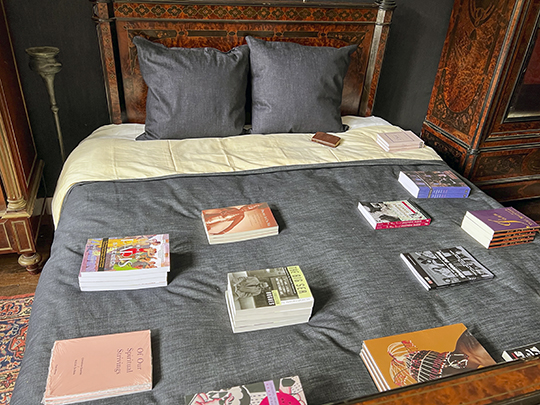 Bed book display
Bed book display
©Entrée to Black Paris
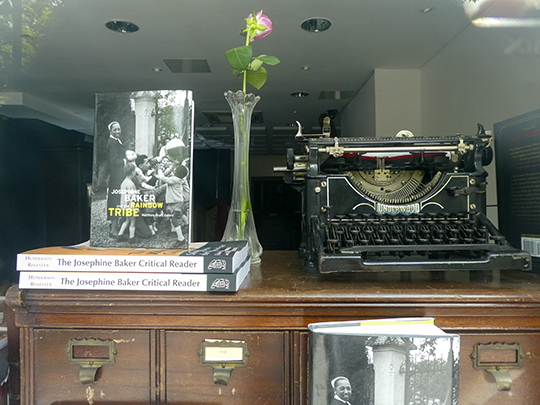
Window display
©Entrée to Black Paris
We always aim to create a singular experience that you could never have anywhere else.
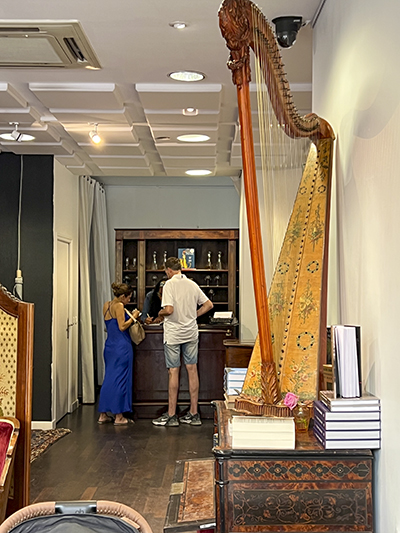
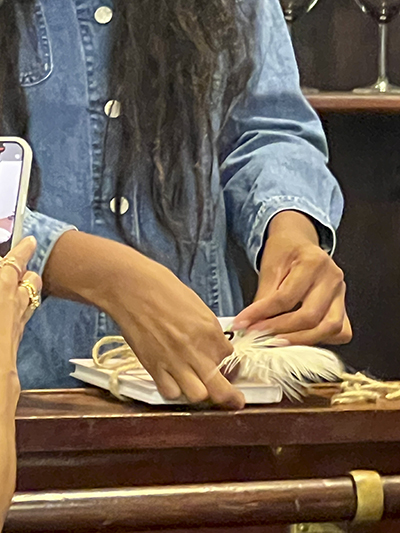
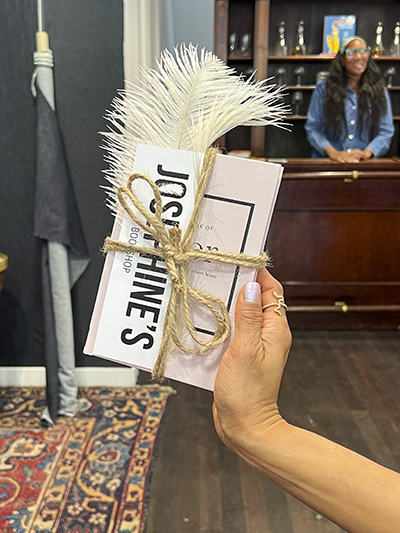
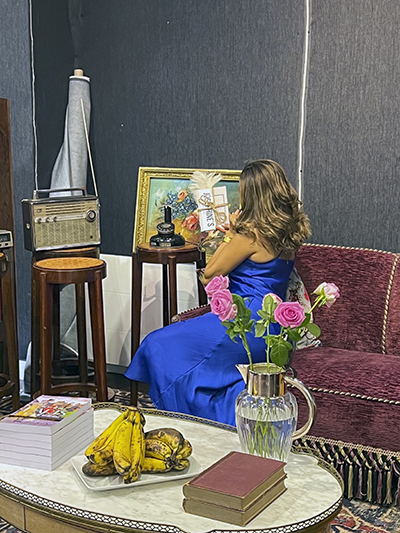 Purchasing a book at Josephine's Bookshop
Purchasing a book at Josephine's Bookshop
Images ©Entrée to Black Paris
Downstairs, the Rainbow Room, is dedicated to Carrie McDonald, Josephine’s mother, who was a washer woman and caretaker to Josephine’s children.
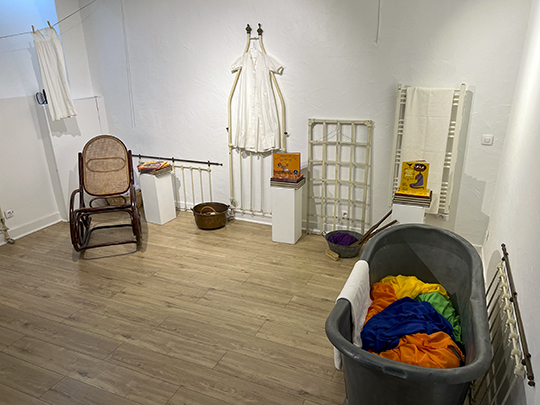 The Rainbow Room
The Rainbow Room
©Entrée to Black Paris
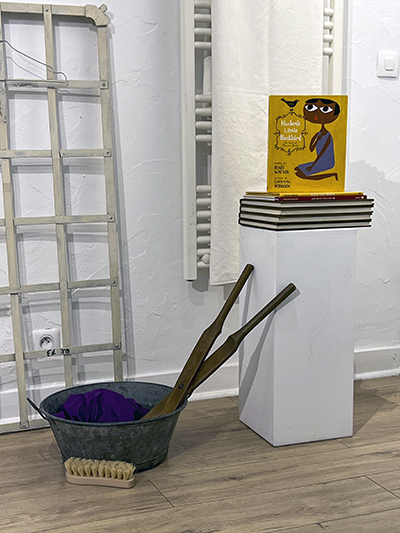
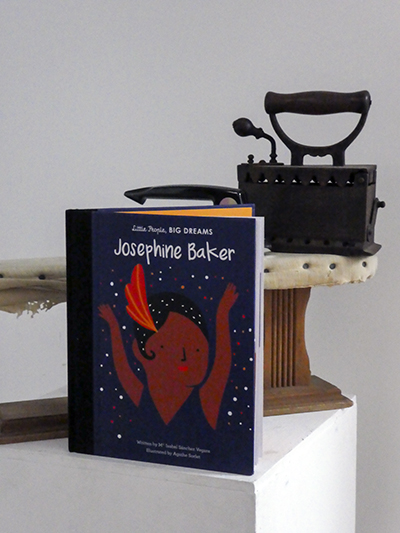
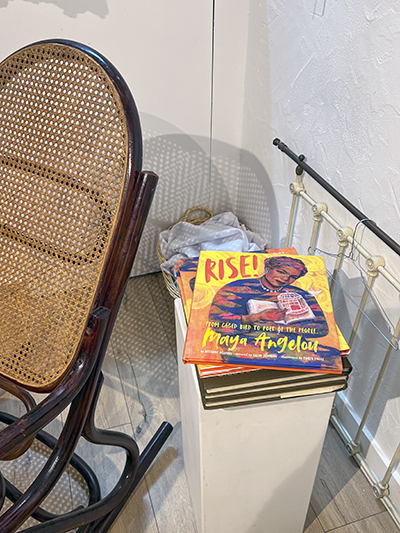
Book displays in the Rainbow Room
Images ©Entrée to Black Paris
There are lots of books hidden in plain site–in drawers, on dressers, in the closet, etc. It’s designed to stimulate the senses and keep folks present.
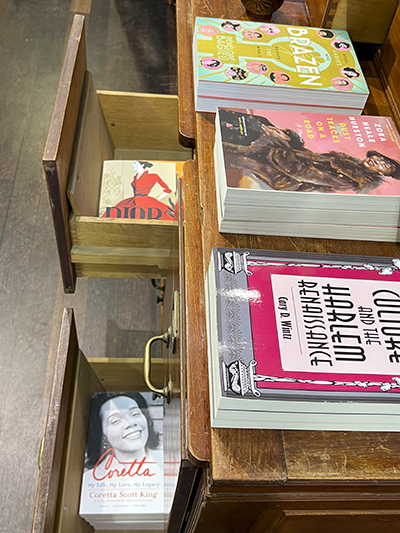
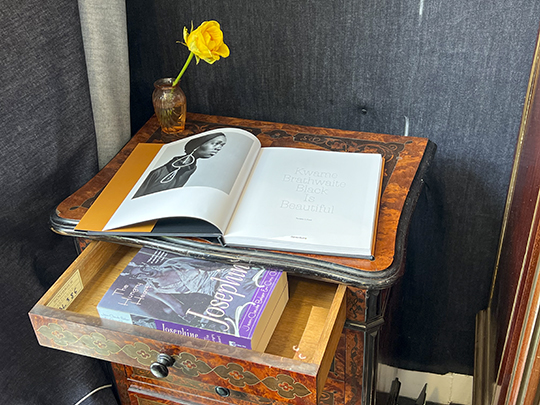
Books "hidden in plain sight"
Images ©Entrée to Black Paris
It’s also very much a tactile experience. The perfume bottle has real perfume that you can smell, the harp really plays, so does the piano, you can rock in the rocking chair, wash the fabric in the wash bin, make a wish into water.
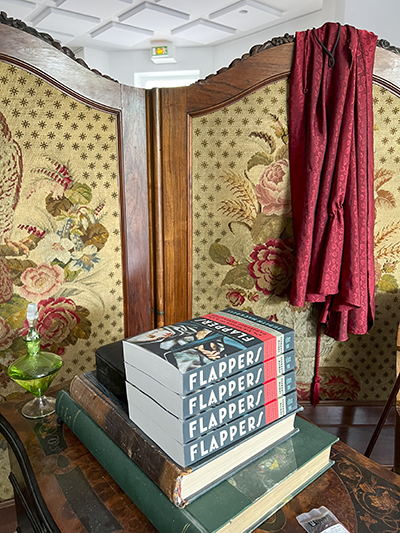 Boudoir book display, perfume bottle, and garment
Boudoir book display, perfume bottle, and garment
©Entrée to Black Paris
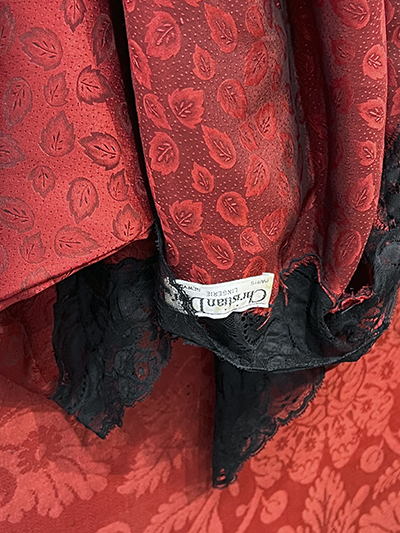
Christian Dior garment
©Entrée to Black Paris
This is just what we were able to pull off in seven days, on a tight budget, and a few hundred square foot of space.
ETBP: Describe the challenges you’ve had with obtaining the books you are selling at Josephine’s.
JC: We started to chat about a concept called Books Without Borders in an interview with Lori L. Tharps of Read, Write, & Create. It is a concept that we hope others pick up and run with.
Books are a cultural bedrock. We believe that:
1) Books should be way easier and cheaper to ship both nationally and internationally. For one children’s book sent for the installation, the sender paid $26 to send and I paid another $20 to receive it. This process was important so I could see the issues in the system, and that is a huge one.
2) Authors are not getting access to their own books to do with as they please and that is ridiculous. So many authors have reached out to me wanting to donate a book and couldn’t because they didn’t have copies of their own damn books.
3) Publishing houses, especially the very large ones, have not been held accountable for the abusive ways they have treated authors throughout the years and that gets to be addressed.
I was in Ms. Toni Morrison’s archive at Princeton where we built Toni’s Bookshop and there was a letter to Ms. Toni Morrison from Ms. Nina Simone saying Ms. Nina Simone had never received her royalties–blasphemous!
While the actors and writers in Hollywood have a union and are on strike, we’ve never seen that same level of push and organizing by authors, and we get to.
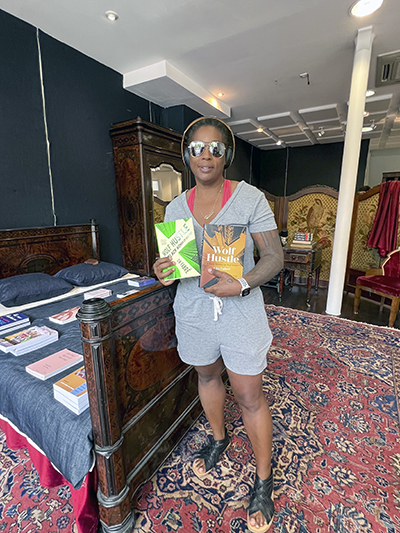 Cin Fabré - one of the authors having difficulty accessing her own books
Cin Fabré - one of the authors having difficulty accessing her own books
©Entrée to Black Paris
ETBP: Are these problems specific to France, or do you think you’ll encounter similar difficulties when you go to Kenya next year?
JC: The path with no beginning is worth beginning. That said, I am not sure. There will likely be some similar and some different challenges no matter where we go.
I am learning on the job. I know we have a huge shipping container of books that we intend to ship to Nairobi in partnership with our South Jersey friends from BookSmiles and it shouldn’t cost us our arms, legs, and firstborns to do it.
ETBP: What have you learned from your previous pop-up bookshops?
JC: This question is impossible to answer in a few sentences ...
I learned mostly that it is possible and important and we should continue by any means necessary.
I learned to listen and be obedient to the call.
I learned that the earth (and beyond) is our home and we should experience as much of her as we possibly can.
I learned to follow the signs.
I learned that I am because you are and you are because I am.
I learned that I am a part of the all and all is a part of me.
I learned always that everything unfolds in perfect order.
Same lessons over and over again.
ETBP: You spoke about a “sister city” relationship between Philadelphia and Paris* and said that you’re interested in seeing this develop more fully. At present, there is no agreement in place between the two cities. How do you envision moving this idea forward?
JC: The "sister city" relationship that I was describing is rooted in the work and intention of Benjamin Franklin**, not any current agreement.
Benjamin Franklin declared the two cities sisters. He was the U.S. ambassador to France and in that role, he placed many French influences on Philadelphia. It was through him that I got to understand the many intentional ways that Paris influences Philadelphia.
Franklin loved the French aesthetic and decided to pay homage to its beauty by replicating much of it— from Philly’s city hall which is inspired by Hotel de Ville to the Philadelphia Museum of Art designed by Julien Abeke who was married to a French woman, not to mention the Rodin Museum and of course the parkway that is Franklin’s namesake, which was designed by two Frenchmen.
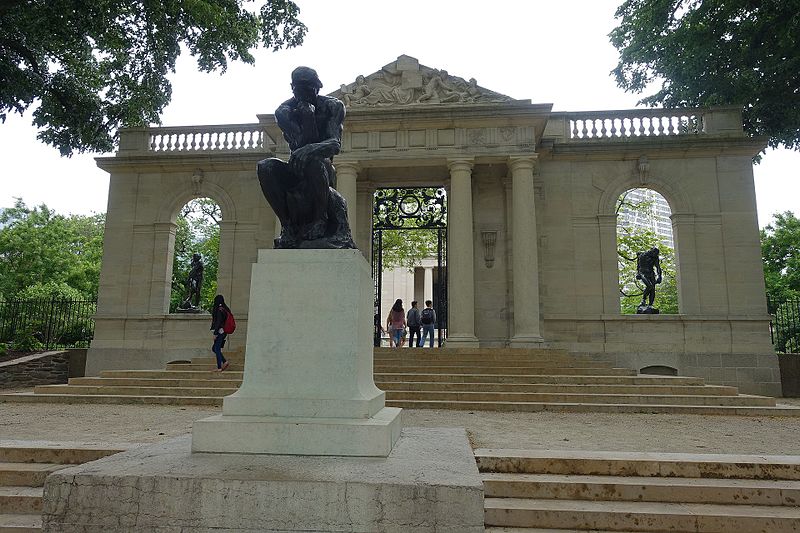 Rodin Museum in Philadelphia
Rodin Museum in Philadelphia
Gordon Makryllos
CC-BY-SA 4.0
But while there is much of Paris in Philly, there is not nearly enough of Philly in Paris. Not a French twist on cheesesteaks in sight, not a Tasty Cake-inspired crepe, and not a Harriett's-like bookshop, called Josephine’s—until now. So I think it’s important to continue to build on the relationship of the sister cities that Franklin envisioned.
The daunting question for a little sister like Philly is what does she have to offer her older sister, Paris? What can Paris–the city with everything—learn from Philly, the city of Sisterly Affection? Maybe how to celebrate Black women poets like Yolanda Wisher and Trapeta B. Mayson are doing with ConsenSIS, or how to nurture Black girls spirits, the way Vashti DuBois is doing with The Colored Girls Museum?
It’s only right that Parisians come try Charisse McGill’s French Toast Bites, right? And eat oxtails at Amina’s.
And of course our big sister MUST take the Sisterhood Sit-In Trolley Tour with Starfire designed by you know who—wink wink.
With the Olympics just around the corner, maybe Parisians trying to avoid the crowds should come hang out with us in the Illadelph for a bit. It will feel familiar—like a home away from home. Parisians will see themselves reflected in our universities, restaurants, parks, and architecture, not to mention the raw realness of spirited debates.
There’s much to learn from your little sister now, Paris. Perhaps no one has ever invited you to come visit and see what she has been up to, but consider this an official opening of the door.
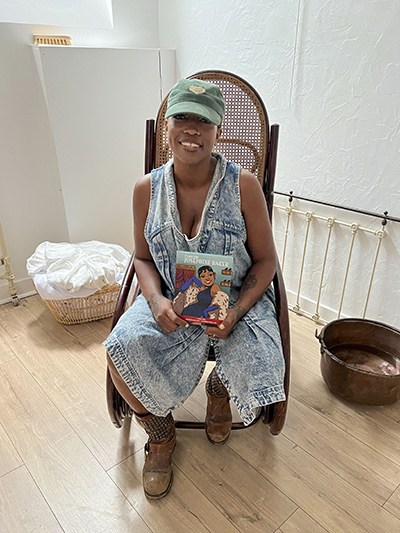
Jeannine Cook
©Entrée to Black Paris
*What Chicago and Washington, D.C. call “sister city” arrangements with Paris are called “friendship pacts” or “cooperation pacts” by the French. The Paris mayor’s office says that Paris’ only sister city is Rome.
**Before Cook returned to Paris, she got to research the work of Benjamin Franklin as she was working on incorporating books into the design of a new restaurant/hotel in Olde City Philadelphia called The Morris at 8th and Walnut. This historical location was once a hangout for what she calls "contradictory thinkers" like Franklin – "contradictory" because as Cook says, "as smart and bold as he was, he didn’t have the forethought to admonish slavery and other social ills of the time." This makes her wonder what social ills are we are allowing now that will be completely taboo in the future.

 Our Walk: Black History in and around the Luxembourg Garden - Click here to book!
Our Walk: Black History in and around the Luxembourg Garden - Click here to book!